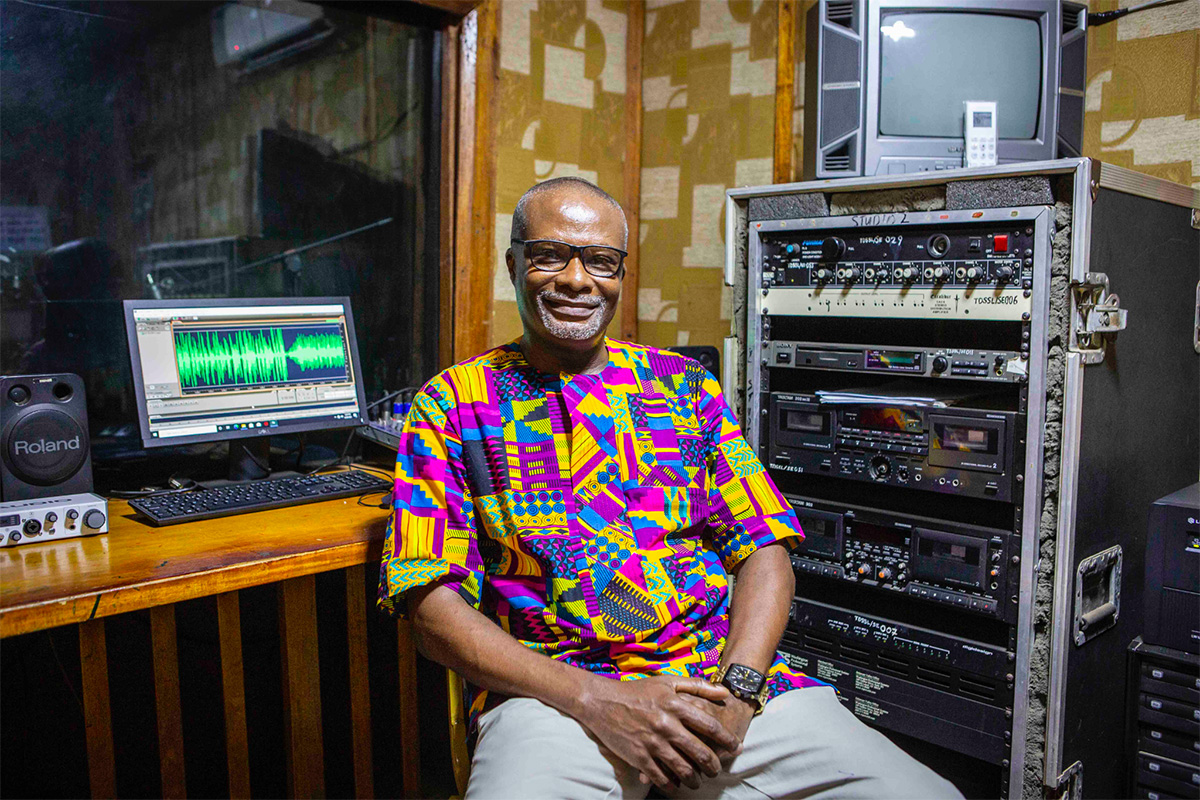
KINGFISHER
“We came to make peace, we won't leave without it.”
“In that moment I thought, 'This is it, my end has come.' Something hit me in the head, and I collapsed," says Emrys, the media producer for Talking Drum Studio. In 2000, as the war was still ongoing, Emrys — then known as DJ Kingfisher — performed at a peace festival organized by TDS. Thousands of people flocked to the event. "We could have filled a soccer stadium with them." Among the crowd, he could see weapons. Combatants were there, too.
Things did not go as planned. The sound system would not start. As the public’s frustration grew, rumors began to spread that TDS had come only to get money out of them. "People started shooting in the air. They were yelling to burn everything, what we had brought, as well as the stage I was on."
Kingfisher's popularity as a well-known artist saved his life. "A few people recognized me and helped me and the equipment over the fence. As soon as I got to the other side, the flames engulfed everything."
Still in shock, Kingfisher couldn't believe his ears when, the next day, the director of the organization told him, "We came to make peace, we won't leave without it." It was a revelation. "It stirred something in me. Those words touched me to the core," he says. The next day, the remnants of the disaster were no longer visible. Kingfisher returned to the stage. By the end of the show, the crowd kept shouting, "Talking Drum, we love you!”
A few months later, Kingfisher was hired to produce the legendary radio drama Atunda Ayenda. "I started in 2001 with the first episode. Today, we have produced 4450 episodes. No one in Sierra Leone, no organization, radio or television, has ever produced for so long." In its early days, the show, which stands for "Lost and Found," invited those who had lost their way, the fighters, to lay down their arms and find their path back to society. "People paid less attention to the men of power than to the artists, musicians, and playwrights. That's where the idea for the drama came from."
Atunda Ayenda is more than voices and stories on the radio. "TDS would go behind rebel lines to meet with the combatants. It was their story we were telling, their truth, that you wouldn't hear on other radio stations." And they listened. After their demobilization, some even came to the studio to meet those who gave them the courage to change their lives.
Today, the show continues to change people’s lives. "When people have problems, and they feel they have no one to turn to, they come to us to have them heard. That's the kind of credibility people give us: we are their voice."
TDS pioneered new ways to tell people’s stories. It has provided the impetus for a shift in the media landscape in Sierra Leone, inspiring many other broadcasters to address the root causes of conflicts and provide more platforms for the opinions of Sierra Leoneans. "The only thing that no one has managed to replicate is our radio drama."
The organization's values are now ingrained in both listeners and hosts, like Kingfisher. "It's our job to change minds away from violence. Many of those who have worked with us have gone on to form their civil society organizations. Their advocacy work builds on what they learned from TDS. Our dream is that people will continue to put our values into practice to make our country a little better every day”.